 |
Anoles
|
|
- Attention: They need no attention. Just observe them.
- Maintenance/handling: Easy
- Day/night active: Diurnal
- Allergy characteristics: Usually not a problem for allergy sufferers.
- Messy: Contained and clean.
- Odor: Almost no odor.
- Noise: silent
- Grooming Requirements: none
- Rodent/insect phobia: Eat insect entrees that may upset the squeamish.
- Activity Level: No physical activity required for these pets.
|
- Housing: Aquarium
- Space Requirements: 2 feet tank
- Trainability: May be trained to be hand fed.
- Responsiveness: Not responsive
- Life span: 3 years
- Size: 6 to 8 inches
- Kid appropriateness: Not Recommended
- Pet compatibility: OK
- Est. expense: $110/Year
|
|
 |
Ants
|
|
- Attention: They need no attention. Just observe them.
- Maintenance/handling: Almost none
- Day/night active: Diurnal
- Allergy characteristics: No allergy related problems.
- Messy: Because of their containment they are a very clean little society.
- Odor: Almost no odor.
- Noise: silent
- Grooming Requirements: none
- Rodent/insect phobia: A bug that few have an aversion to.
- Activity Level: No physical activity required for these pets.
|
- Housing: Aquarium
- Space Requirements: .5 feet
- Trainability: Not trainable.
- Responsiveness: Not responsive
- Life span: 8 to 10 weeks
- Size: A small fraction of an inch
- Kid appropriateness: Ants make fascinating pets for children.
- Pet compatibility: OK
- Est. expense: $60/Year
|
|
 |
Boa Constrictors
|
|
- Attention: Will tolerate no attention for long periods of time. If trained will tolerate handling
- Maintenance/handling: Difficult
- Day/night active: Nocturnal
- Allergy characteristics: Usually not a problem for allergy sufferers.
- Messy: Contained and clean.
- Odor: Almost no odor.
- Noise: silent
- Grooming Requirements: none
- Rodent/insect phobia: Eat entrees that may upset the squeamish.
- Activity Level: No physical activity required for these pets.
|
- Housing: Aquarium
- Space Requirements: Large cage
- Trainability: Not trained but tamed.
- Responsiveness: Not responsive
- Life span: 20 years
- Size: 8 to 11 is typical. 18 feet possible but very, very rare.
- Kid appropriateness: Not appropriate without mature supervision
- Pet compatibility: Given the opportunity will eat rodent, rabbits or birds.
- Est. expense: $225/Year
|
|
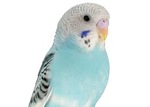 |
Budgerigars and parakeets
|
|
- Attention: Easy care family pets.
- Maintenance/handling: Easy
- Day/night active: Diurnal
- Allergy characteristics: They kick-up--actually flap up--dust and dander
- Messy: Somewhat messy; spread seeds
- Odor: Somewhat smelly.
- Noise: Generally less noisy. Usually not very noisy when compared to larger birds like macaws or cockatoos, but can become loud at times when over-excited, protecting their territory or when they think they are being ignored.
- Grooming Requirements: minimal
- Rodent/insect phobia: Not a problem for most people with certain phobias.
- Activity Level: Minimal activity required for these pets.
|
- Housing: Cage
- Space Requirements: 3 cubic feet
- Trainability: Trainable. A few birds might be trained to speak. Not every bird can or will. Hand-raised birds more prone to talk.
- Responsiveness: Playful, affectionate. Will respond to your voice.
- Life span: 5 to 20 years
- Size: 7.5 inches
- Kid appropriateness: Some birds dislike rough or clumsy handling so they do not make good pets for infants and very small children.
- Pet compatibility: Dogs, cats, snakes, ferrets can pose danger. Presence will stress out birds.
- Est. expense: $130/Year
- Note: The parakeet shown is a Redfronted Parakeet from New Zealand a species not in common use as a pet. Photo courtesy of Martin Kramer
- Which Bird? visit our Exotic Bird Selector
|
|
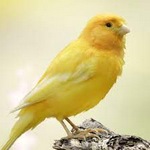 |
Canaries
|
|
- Attention: Easy care family pets. Prefer not to be handled. Will respond to your whistle (or a teapots)
- Maintenance/handling: Easy
- Day/night active: Diurnal
- Allergy characteristics: They kick-up--actually flap up--dust and dander
- Messy: Somewhat less messy
- Odor: Somewhat smelly.
- Noise: Relatively quiet. Not abrasive when they do sound.
- Grooming Requirements: minimal
- Rodent/insect phobia: Not a problem for most people with certain phobias.
- Activity Level: No physical activity required for these pets.
|
- Housing: Cage
- Space Requirements: 5 cubic feet
- Trainability: Very low trainability
- Responsiveness: Happier not being physically handled. Will respond to your whistle.
- Life span: 7 to 10 years
- Size: 5 to 5.5 inches
- Kid appropriateness: Great first-time pets for responsible children.
- Pet compatibility: Dogs, cats, snakes, ferrets can pose danger. Presence will stress out birds.
- Est. expense: $130/Year
- Note: The photo shows wild canaries as they are found on the Canary Islands and from which the pet birds descend. Photo courtesy of Martin Kramer
- Which Bird? visit our Exotic Bird Selector
|
|
 |
Cats
|
|
- Attention: They vary from aloof to affectionate, usually on their terms.
- Maintenance/handling: Easy
- Day/night active: Somewhat nocturnal
- Allergy characteristics: Usually a problem.
- Messy: Most breeds not compatible to a spotless home, but usually cleaner than dogs. Often personally meticulous.
- Odor: Cat box odor may be a problem.
- Noise: Yowls and meows, often at times when you would rather be sleeping.
- Grooming Requirements: some
- Rodent/insect phobia: Cats bring rodents them home. Mice often become living toys for the cats amusement,
- Activity Level: Minimal activity required for these pets.
|
- Housing: Run of the house, kennel or dog house.
- Space Requirements: Owners house
- Trainability: Harder than dogs to train.
- Responsiveness: Very affectionate.
- Life span: 14 to 20 years
- Size: 20 lbs.
- Kid appropriateness: Their independent nature is a plus in regards to kids.
- Pet compatibility: Not compatible with birds, rabbits or rodents.
- Est. expense: $394/Year
- Which Cat? visit our Cat Breed Selector
|
|
 |
Chinchillas
|
|
- Attention: Properly reared, chins will seek your attention.
- Maintenance/handling: Easy
- Day/night active: Nocturnal
- Allergy characteristics: Dander may be a problem.
- Messy: Clean
- Odor: Can be smelly.
- Noise: Rattle wheels
- Grooming Requirements: none
- Rodent/insect phobia: Not a problem for most people with certain phobias.
- Activity Level: Very minimal activity required for these pets.
|
- Housing: Cage
- Space Requirements: 2 cubic feet
- Trainability: Might even be able to teach it a few tricks lively and active
- Responsiveness: With gentle handling a chinchilla will enjoy coming out of its cage and spending time with you.
- Life span: 6 to 10 years
- Size: 1 to 2 lbs.
- Kid appropriateness: Not ideal for young kids
- Pet compatibility: No cats or free roaming ferrets, dogs not advised, reptiles caution.
- Est. expense: $202/Year
- Photo courtesy of Amy Sturm.
|
|
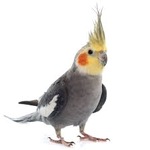 |
Cockatiel
|
|
- Attention: Friendly and playful. Will demand attention.
- Maintenance/handling: Easy
- Day/night active: diurnal
- Allergy characteristics: They kick-up--actually flap up--dust and dander
- Messy: Somewhat messy; spread seeds
- Odor: Somewhat smelly.
- Noise: noisy
- Grooming Requirements: minimal
- Rodent/insect phobia: Not a problem for most people with certain phobias.
- Activity Level: Minimal activity required for these pets.
|
- Housing: Cage
- Space Requirements: 5 cubic feet
- Trainability: Very good personality. Can be trained to mimic whistles and short phrases. Some people say the males are more easily trained. However, this fact has been debated by many people.
- Responsiveness: Playful, affectionate.
- Life span: 5 to 20 years
- Size: 7 inches
- Kid appropriateness: Great for responsible kids. Some birds do not appreciate rough handling so they do not make good pets for infants and very small children.
- Pet compatibility: Dogs, cats, snakes, ferrets can pose danger. Presence will stress out birds.
- Est. expense: $130/Year
- Which Bird? visit our Exotic Bird Selector
|
|
 |
Dogs
|
|
- Attention: Renowned for their loyalty and devotion to their owners. Most breeds need and seek human interaction.
- Maintenance/handling: Difficult
- Day/night active: Diurnal
- Allergy characteristics: Often a problem. Some breeds OK.
- Messy: Most breeds not compatible to a spotless home.
- Odor: Can be smelly.
- Noise: All but one breed of dogs bark. Check our dog breed selector for quiet breed.
- Grooming Requirements: yes
- Rodent/insect phobia: Not a problem for most people with certain phobias.
- Activity Level: Moderate activity required for these pets.
|
- Housing: Run of the house, kennel or dog house.
- Space Requirements: Owners house.
- Trainability: Very trainable.
- Responsiveness: Very affectionate.
- Life span: 12 to 20 years
- Size: Varies widely, from 2 to 250
- Kid appropriateness: Good pets for infants and very small children.
- Pet compatibility: May be a problem with birds or rodents
- Est. expense: $553/Year
- Which Dog is right for you? There is a lot of variation.
- Which Dog? visit our Dog Breed Selector
|
|
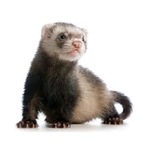 |
Ferrets
|
|
- Attention: They are friendly and playful.
- Maintenance/handling: Moderate. That is to say ferrets are time consuming and hands-on. Easy animals to handle and maintenance is easier than that of a dog.
- Day/night active: Diurnal
- Allergy characteristics: Dander may be a problem.
- Messy: They hide and store old food. They also like to tip over bathroom trash cans.
- Odor: Ferrets produce a musky smell and can spray, although not as potently as their cousin the skunk. They hide leftovers. Your nose will remind you if you forget to change the litter.
- Noise: Silent
- Grooming Requirements: Yes. Baths, toenail trims, ear cleaning
- Rodent/insect phobia: Not a problem for most people with certain phobias.
- Activity Level: Light to moderate activity required for these pets.
|
- Housing: House & cage
- Space Requirements: Cage for one ferret can be 24 by 24 inches (or 18 by 30 inches) Run area is a standard room size.
- Trainability: Trainable
- Responsiveness: Very affectionate and responsive.
- Life span: 6 to 9 years
- Size: 1 to 5 lbs.
- Kid appropriateness: Not for small kids. They are wont to bite small fingers. Great pets for grade school age children through junior high. The outside interests of older teenagers might interfere with time required to care for a ferret.
- Pet compatibility: Interaction with birds, reptiles, rodents, or rabbits is not recommended. Good with most dogs and cats.
- Est. expense: $206/Year
- Ferret photo courtesy Rob Tobin [Lemans@execpc.com]
|
|
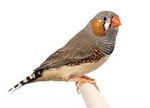 |
Finch (Zebra)
|
|
- Attention: Easy care family pets. Can be without human contact.
- Maintenance/handling: Easy
- Day/night active: Diurnal
- Allergy characteristics: They kick-up--actually flap up--dust and dander
- Messy: Somewhat less messy
- Odor: Somewhat smelly.
- Noise: Relatively quiet. Not abrasive when they do sound.
- Grooming Requirements: minimal
- Rodent/insect phobia: Not a problem for most people with certain phobias.
- Activity Level: No physical activity required for these pets.
|
- Housing: Cage
- Space Requirements: 3 cubic feet
- Trainability: Very low trainability.
- Responsiveness: Happier not being physically handled. Will respond to your whistle.
- Life span: 2 to 3
- Size: 3 to6 inches
- Kid appropriateness: Great for responsible kids. Some birds do not appreciate rough handling so they do not make good pets for infants and very small children.
- Pet compatibility: Dogs, cats, snakes, ferrets can pose danger. Presence will stress out birds.
- Est. expense: $130/Year
|
|
 |
Fish
|
|
- Attention: They need no attention. Just observe them.
- Maintenance/handling: Easy
- Day/night active: Diurnal
- Allergy characteristics: Not associated with common allergy related problems.
- Messy: Contained and clean.
- Odor: Almost no odor.
- Noise: silent
- Grooming Requirements: none
- Rodent/insect phobia: Not a problem for most phobias.
- Activity Level: No physical activity required for these pets.
|
- Housing: Aquarium
- Space Requirements: 2 feet tank
- Trainability: No
- Responsiveness: Not responsive
- Life span: 10 years
- Size: Varies
- Kid appropriateness: Good kid pet.
- Pet compatibility: Aquarium needs to protected from cat and ferret paws.
- Est. expense: $89/Year
|
|
 |
Frogs
|
|
- Attention: They need no attention. Just observe them.
- Maintenance/handling: Easy
- Day/night active: Nocturnal
- Allergy characteristics: Not associated with common allergy related problems.
- Messy: Contained and clean.
- Odor: Almost no odor.
- Noise: Moldy noisy
- Grooming Requirements: none
- Rodent/insect phobia: Eat entrees that may upset the squeamish.
- Activity Level: No physical activity required for these pets.
|
- Housing: Aquarium
- Space Requirements: 2 cubic feet
- Trainability: No
- Responsiveness: do not need interaction
- Life span: 10 years
- Size: 2 to4 inches
- Kid appropriateness: Kids should look but not handle.
- Pet compatibility: Aquarium needs to protected from cat and ferret paws.
- Est. expense: $155/Year
|
|
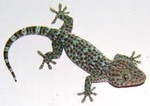 |
Geckos
|
|
- Attention: They need no attention. Just observe them.
- Maintenance/handling: Easy
- Day/night active: Nocturnal
- Allergy characteristics: Not associated with common allergy related problems.
- Messy: Contained and clean.
- Odor: Almost no odor.
- Noise: silent
- Grooming Requirements: none
- Rodent/insect phobia: Eat insect entrees that may upset the squeamish.
- Activity Level: No physical activity required for these pets.
|
- Housing: Aquarium
- Space Requirements: 2 cubic feet
- Trainability: May be trained to come for food.
- Responsiveness: Not responsive
- Life span: 10 years
- Size: 2 pounds
- Kid appropriateness: Not great, tails break off. Which does grow back, but possibly distressing for either the animal and the child.
- Pet compatibility: Large birds a problem.
- Est. expense: $110/Year
|
|
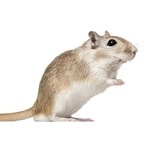 |
Gerbils
|
|
- Attention: They need and prefer minimal attention. Mostly watch them.
- Maintenance/handling: Very tolerant and require little in the way of special care
- Day/night active: Diurnal
- Allergy characteristics: Dander may be a problem.
- Messy: cages do not need to be cleaned as frequently
- Odor: Produce little urine
- Noise: Rattle wheels
- Grooming Requirements: none
- Rodent/insect phobia: Not a problem for most people with certain phobias.
- Activity Level: Very minimal activity required for these pets.
|
- Housing: Cage
- Space Requirements: 2 cubic feet
- Trainability: Generally easy to tame.
- Responsiveness: Responsive.
- Life span: 2 to 5
- Size: Size: 4 w/4 tail
- Kid appropriateness: OK
- Pet compatibility: Cats likely will perceive them as a meal. Hungry eyes can be distressing.
- Est. expense: $93/Year
|
|
 |
Goats
|
|
- Attention: A fair amount of attention required. Goats are, by nature, friendly and affectionate. They are quite curious, and have been likened to a cross between a dog, cat, and 5 year old child. Goats, like a 5-year-old, can be rambunctious.
- Maintenance/handling: Difficult. Goats that have been treated affectionately and appropriately are relatively easy to handle. As herd animals, no one should ever attempt having just one. It places undue stress on the single animal deprived of its herd.
- Day/night active: Diurnal. Goats are of a herd nature. As such, they bed down for the night with their herd and are reluctant to be aroused.
- Allergy characteristics: May be problematic for allergy sufferers because of their coats and the vegetatation they eat. NOTE: The milk produced may help allergy sufferers. Reportedly drinking the milk from goats who eat poison ivy will give one an immunity to poison ivy!
- Messy: Messy in the way of barnyard animals. Goats are very clean, and their manure comes in the form of compact berries that is simple to rake up or clean up.
- Odor: Can be smelly, however, only breeding bucks are smelly. Does and wether bucks are not
- Noise: Nearly silent
- Grooming Requirements: Minimal, trim feet. Some brushing is ideal.
- Rodent/insect phobia: A non-issue.
- Activity Level: Light activity required for these pets.
|
- Housing: Stable and pasture
- Space Requirements: 24 cubic feet pen and a pasture area. Goats are browsers, and, as such, like to munch on trees, rose bushes, etc. They require substantial fencing to contain them and to keep would-be predators out.
- Trainability: Can be trained to pull a child in a small wagon. Somewhat unpredictable.
- Responsiveness: Being social they demand attention if a single pet. However, Goats like attention, but do not demand it if they have another goat for companionship, which is recommended.
- Life span: The life span of a goat is 6-10 years for bucks, 8-12 years for does.
- Size: Depending on the breed and gender, a mature goat weighs between 50-250 pounds.
- Kid appropriateness: OK to excellent.
- Pet compatibility: One must be extremely careful about keeping dogs and goats together. Goats have a natural fear of them; dogs have a natural prey-drive towards them.
- Est. expense: $480/Year
|
|
 |
Guinea Pigs
|
|
- Attention: Once they get used to humans, they love to cuddle.
- Maintenance/handling: Easy
- Day/night active: Nocturnal
- Allergy characteristics: Dander may be a problem.
- Messy: More or less clean, but cages need frequent cleaning.
- Odor: Somewhat smelly.
- Noise: Rattle wheels, whistle when they get excited. True to their pig handle, they squeak and oink.
- Grooming Requirements: The most labor-intensive chore is cleaning the cage, which requires about half an hour to an hour once or twice a week. Although bathing guinea pigs is not required, it does keep the smell down, keeps them clean (infections are a small animal's worst medical enemy), and enables you to spot minor problems before they become big ones. It takes me about an hour every 2 to 3 weeks to bathe and groom mine. -- Ed Rehfeld, Washington, DC
- Rodent/insect phobia: Not a problem for most people with certain phobias.
- Activity Level: No physical activity required for these pets.
|
- Housing: Cage
- Space Requirements: 2 cubic feet
- Trainability: Docile. Guinea pigs are ideal pets if you're too busy to train a cat or dog properly, have limited space, and want a pet that requires very little care.
- Responsiveness: Cuddly. They tolerate handling by children as many grade school teachers can attest.
- Life span: 5 to 8
- Size: 1 to 3 pounds
- Kid appropriateness: Great first-time pets for responsible children
- Pet compatibility: No cats or free roaming ferrets, dogs not advised, reptiles caution.
- Est. expense: $229/Year
- These are positively delightful little creatures. They are the most adorable little furballs you'll probably ever encounter, they don't bite (though they do like to nibble), they don't scratch, they make funny little noises (especially when you approach them with a treat), and once they get used to humans, they love to cuddle. A good guinea pig primer from any pet store should give you all the information you need to get started. If you get them, though, get at least two: they are very social animals and they crave company; plus, watching them interact with and "talk" to each other is half the fun. -- Ed Rehfeld, Washington, DC
|
|
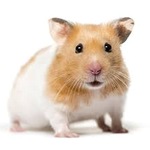 |
Hamsters
|
|
- Attention: They need and prefer minimal attention. Mostly watch them.
- Maintenance/handling: Easy.
- Day/night active: Nocturnal.
- Allergy characteristics: Dander may be a problem.
- Messy: More or less clean, but cages need weekly cleaning.
- Odor: Pungent urine and their cages can be smelly if cage is not cleaned regularly.
- Noise: May rattle wheels. Try newer wheels which make little or no noise. Possible noise from gnawing at bars.
- Grooming Requirements: Minimal, long haired males sometimes need grooming every 2-3 days to keep shavings from matting up the hair
- Rodent/insect phobia: Not a problem for most people with certain phobias.
- Activity Level: No physical activity required for these pets.
|
- Housing: Cage
- Space Requirements: 2 cubic feet.xx
- Trainability: Trainable with some effort.
- Responsiveness: Hamsters are can be docile and accept human interaction. The more common experience are hamsters that happily prefer to never see or interact with humans.
- Life span: 1 to 4 years. 2 - 2.5 years is typical.
- Size: Syrian hamsters are 6-7 ounces and 6-7 inches in length. Dwarf hamsters around 40-60 grams and 8-12 cm in length (except Roborovskis which are 4-5 cm. and 25-40 grams). Chinese hamsters have obvious tail.
- Kid appropriateness: Young children should be supervised when handling hamsters. Syrians more suitable than dwarfs.
- Pet compatibility: No cats or free roaming ferrets, dogs not advised, reptiles caution.
- Est. expense: $97/Year
- Bitey the dwarf hamster, photo courtesy Scott Kammerer
|
|
 |
Hedgehogs
|
|
- Attention: They need and prefer minimal attention. Mostly watch them. Seem content to live alone. One owner offers this opinion, "Hedgehogs need a great deal of attention. Otherwise, they will not be social, and you will never see their faces."
- Maintenance/handling: Not the easiest pet to maintain. Easier than hampsters
- Day/night active: Nocturnal
- Allergy characteristics: Dander may be a problem.
- Messy: Very clean animals, cages need occasional cleaning.
- Odor: Can be smelly. In the words of an owner, "Hedgehogs rarely have an odor, if the cage is kept clean".
- Noise: Rattle wheels
- Grooming Requirements: Nails must be trimmed. Should be bathed a few times per year.
- Rodent/insect phobia: Not a problem for most people with certain phobias.
- Activity Level: Very minimal activity required for these pets.
|
- Housing: Cage
- Space Requirements: 2 cubic feet
- Trainability: Not trainable but tamable.
- Responsiveness: Seem content to live alone.
- Life span: 6 to 10 years
- Size: 4 to 8 inches 6 ounces to 2 pounds
- Kid appropriateness: Rough handling by young kids is definitely should not be allowed
- Pet compatibility: No cats or free roaming ferrets, dogs not advised, reptiles caution.
- Est. expense: $105/Year
- Thanks to owner K.D. Shull for the photo
|
|
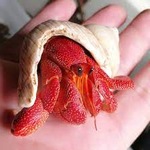 |
Hermit Crabs
|
|
- Attention: They need no attention. Just observe them.
- Maintenance/handling: Easy
- Day/night active: Diurnal
- Allergy characteristics: No allergy related problems.
- Messy: Contained and clean.
- Odor: Almost no odor.
- Noise: silent
- Grooming Requirements: none
- Rodent/insect phobia: Not a problem for most phobias.
- Activity Level: No physical activity required for these pets.
|
- Housing: Aquarium
- Space Requirements: 2 feet tank
- Trainability: No
- Responsiveness: Not responsive
- Life span: 6 to 10 years
- Size: 5 inches
- Kid appropriateness: Good kid pet.
- Pet compatibility: OK
- Est. expense: $60/Year
- "Mr. Limpett" photo courtesy Jeanne Touw
|
|
 |
Horses
|
|
- Attention: Getting a horse is a major decision. They require a lot of time and attention.
- Maintenance/handling: Difficult
- Day/night active: Diurnal
- Allergy characteristics: Problematic for allergy sufferers because of their coats and the grass they eat.
- Messy: Messy in the way of barnyard animals.
- Odor: smelly
- Noise: Can be loud, but usually not to the annoyance of neighbors.
- Grooming Requirements: yes
- Rodent/insect phobia: Not a problem for most people with certain phobias.
- Activity Level: High level of activity required for these pets.
|
- Housing: Stable and pasture
- Space Requirements: Pasture and stable.
- Trainability: While not every horse will be a Lipizaner stallion, they are highly trainable
- Responsiveness: Very affectionate.
- Life span: 20 to 35
- Size: 500 to 2000 pounds
- Kid appropriateness: Best handled by older children with adult supervision and guidance.
- Pet compatibility: OK
- Est. expense: $2400/Year
|
|
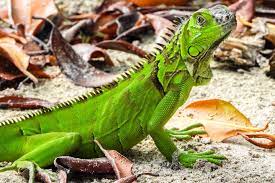 |
Iguanas
|
|
- Attention: Iguanas are very high maintenance and the decision to buy one should not be made lightly.
- Maintenance/handling: Moderate. Proper socialization is important. Untamed, and socialized iguanas are dangerous to their owners and themselves. They may run away and scratch, lash or nip. This makes proper iguana maintenance impossible. A well socialized iguana enjoys people, and will seek its caregiver, family members, even other pets. The socialized iguanas may find your lap for a siesta. They appreciate being rubbed.
- Day/night active: Diurnal
- Allergy characteristics: Usually not a problem for allergy sufferers.
- Messy: Contained and clean.
- Odor: Somewhat smelly.
- Noise: Silent
- Grooming Requirements: Minimal. Clip toe nails.
- Rodent/insect phobia: Herbivores. You should feed your iguana at least 70% greens such as dandelion greens, endive, mustard greens, turnip greens, and collard greens. Fill in with parsnips, butternut squash, figs, green beans, peas, grapes, and raspberries. However, never feed Rhubarb because it is poison to iguanas. -- NIAD.org
- Activity Level: No physical activity required for these pets.
|
- Housing: Aquarium
- Space Requirements: 8 feet long by 3 feet deep and up to the ceiling. Ideally dedicate a room to them.
- Trainability: May be trained to come for food.
- Responsiveness: Not especially responsive other than coming for food.
- Life span: 25 years
- Size: 10 to 20 pounds. Iguanas can reach 5-6 feet within 4-5 years.
- Kid appropriateness: They are powerful and use there teeth to express annoyance. Young kids do not make the best keepers. Salmonella can be transmitted, wash hands carefully.
- Pet compatibility: May be a problem with birds or rodents.
- Est. expense: $218/Year
|
|
 |
Llamas
|
|
- Attention: Respond warmly to humans--especially as juveniles. Less friendly when mature. Owners need to minimize contact when very young (to allow bonding with their mother). Never take them away and bottle raise them, this is just asking for trouble later on.
- Maintenance/handling: Less difficult than some other animals. However it is suggested that people have an experienced mentor at first
- Day/night active: Diurnal
- Allergy characteristics: May be problematic for hayfever sufferers because of their required grassy pasture environment. Llama wool is usually not allergic. People who cannot wear sheep wool items can wear llama.
- Messy: Messy in the way of barnyard animals.
- Odor: Far less smelly than other animal. They use a communal
- Noise: Mostly silent, they do have an alarm call that can be loud. They also
- Grooming Requirements: Bare minimum, shear for heat stress in late spring. Clip toenails as needed ( 1 to 6 times a year). Trying to keep one groomed for show is a major ordeal.
- Rodent/insect phobia: A non-issue.
- Activity Level: Moderate to high level of activity required for these pets.
|
- Housing: Must have shade in summer, and a dry wind break in winter. A three sided shelter works fine. Pasture area.
- Space Requirements: Pasture and stable.
- Trainability: Respond to humans well. Can be trained perform a number of tasks.
- Responsiveness: Have a genuine affection for humans. Spitting is a trait of llamas, but usually only because you get in the way. Llamas do not typically spit on humans.
- Life span: 20 to 25
- Size: 250 to 450 pounds
- Kid appropriateness: Yes. Considering their relatively large size, properly trained llamas are easily handled by young children.
- Pet compatibility: OK
- Est. expense: $300/Year
|
|
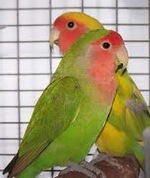 |
Lovebirds
|
|
- Attention: They need a certain amount of your attention.
- Maintenance/handling: Easy
- Day/night active: diurnal
- Allergy characteristics: They kick-up--actually flap up--dust and dander
- Messy: Somewhat messy; spread seeds
- Odor: Somewhat smelly.
- Noise: Not very loud, but voice is high-pitched and calls often.
- Grooming Requirements: minimal
- Rodent/insect phobia: Not a problem for most people with certain phobias.
- Activity Level: Minimal activity required for these pets.
|
- Housing: Cage
- Space Requirements: 5 cubic feet
- Trainability: As with most birds, if gotten while young, can be a very affectionate. Can be trained to talk.
- Responsiveness: Playful, affectionate. Enjoy interaction with humans.
- Life span: 20 years
- Size: 6 to 7 inches
- Kid appropriateness: Some birds dislike rough or clumsy handling so they do not make good pets for infants and very small children.
- Pet compatibility: Dogs, cats, snakes, ferrets can pose danger. Presence will stress out birds.
- Est. expense: $130/Year
- Which Bird? visit our Exotic Bird Selector
|
|
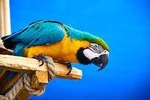 |
Macaws
|
|
- Attention: They may screech to demand your attention.
- Maintenance/handling: Difficult. Requires large space due to large size. Are very demanding and have a tendency to become aggressive or pluck.
- Day/night active: Diurnal
- Allergy characteristics: They kick-up--actually flap up--dust and dander
- Messy: Messy; they will fling food and not just seeds out of their cage. Fruits and veggies can turn to concrete on carpeting!
- Odor: Somewhat smelly. If you keep the cage clean, there will be little to no odor at all.
- Noise: Can be very noisy.
- Grooming Requirements: Require regular flight feather trims and talon (toenail) trims.
- Rodent/insect phobia: Not a problem for most people with certain phobias.
- Activity Level: Some activity required for these pets.
|
- Housing: Cage
- Space Requirements: 36 cubic feet
- Trainability: Requires much attention. Acrobatic. Can be trained to talk - but not considered very good mimics.
- Responsiveness: Playful, affectionate. Enjoy interaction with humans.
- Life span: 50 years
- Size: 3 feet
- Kid appropriateness: No, can not be trusted around kids. Powerful biting beaks and grasping claws.
- Pet compatibility: Dogs, cats, snakes, ferrets can pose danger. Presence will stress out birds.
- Est. expense: $130/Year
- Which Bird? visit our Exotic Bird Selector
|
|
 |
Mice
|
|
- Attention: Not demanding but enjoy interaction
- Maintenance/handling: Easy
- Day/night active: Nocturnal
- Allergy characteristics: Dander may be a problem.
- Messy: clean
- Odor: Can be smelly.
- Noise: May rattle metal cage style wheels. Although newer wheels are silent.
- Grooming Requirements: none
- Rodent/insect phobia: Not the pet for people who dread mice or rats.
- Activity Level: Very minimal activity required for these pets.
|
- Housing: Cage
- Space Requirements: 2 cubic feet
- Trainability: yes, but timid
- Responsiveness: Sociable.
- Life span: 1 to 2 years
- Size: 1/2 to 1 pound, 2 inches with 2 inch tails.
- Kid appropriateness: Fragile, young children should only handle them under supervision
- Pet compatibility: No cats or free roaming ferrets, dogs not advised, reptiles caution.
- Est. expense: $60/Year
|
|
 |
Mynahs
|
|
- Attention: Need relatively high amounts of attention
- Maintenance/handling: Difficult
- Day/night active: Diurnal
- Allergy characteristics: They kick-up--actually flap up--dust and dander
- Messy: Somewhat messy; spread seeds
- Odor: Somewhat smelly.
- Noise: noisy
- Grooming Requirements: minimal
- Rodent/insect phobia: Not a problem for most people with certain phobias.
- Activity Level: Minimal activity required for these pets.
|
- Housing: Cage
- Space Requirements: 12 cubic feet
- Trainability: Can be trained to talk
- Responsiveness: Can be affectionate.
- Life span: 12 years
- Size: 11.5 inches
- Kid appropriateness: Ok under supervision.
- Pet compatibility: Dogs, cats, snakes, ferrets can pose danger. Presence will stress out birds.
- Est. expense: $130/Year
|
|
 |
Newts
|
|
- Attention: They need no attention. Just observe them.
- Maintenance/handling: Easy
- Day/night active: Diurnal
- Allergy characteristics: Usually not a problem for allergy sufferers.
- Messy: Contained and clean.
- Odor: Almost no odor.
- Noise: silent
- Grooming Requirements: none
- Rodent/insect phobia: Eat insect entrees that may upset the squeamish.
- Activity Level: No physical activity required for these pets.
|
- Housing: Aquarium
- Space Requirements: 2 feet tank
- Trainability: Not trainable
- Responsiveness: Not responsive
- Life span: 4 years
- Size: 8 to 10 inches
- Kid appropriateness: Not Recommended
- Pet compatibility: OK
- Est. expense: $160/Year
|
|
 |
Parrots
|
|
- Attention: They may screech to demand your attention.
- Maintenance/handling: Difficult
- Day/night active: Diurnal
- Allergy characteristics: They kick-up--actually flap up--dust and dander
- Messy: Messy; they will fling food and not just seeds out of their cage. Fruits and veggies can turn to concrete on carpeting!
- Odor: Somewhat smelly. If you keep the cage clean, there will be little to no odor at all.
- Noise: Can be very noisy--and being mimics can make human like calls--much to the consternation of neighbors.
- Grooming Requirements: Require regular flight feather trims and talon (toenail) trims.
- Rodent/insect phobia: Not a problem for most people with certain phobias.
- Activity Level: Some activity required for these pets.
|
- Housing: Cage
- Space Requirements: 12 cubic feet
- Trainability: Can be trained to talk
- Responsiveness: Playful, affectionate even demanding of your attention, like a 2 year old.
- Life span: 50 years
- Size: 15 inches
- Kid appropriateness: No, can not be trusted around kids. Powerful biting beaks and grasping claws.
- Pet compatibility: Dogs, cats, snakes, ferrets can pose danger. Presence will stress out birds.
- Est. expense: $160/Year
- Which Bird? visit our Exotic Bird Selector
|
|
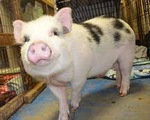 |
Pot-Bellied Pigs
|
|
- Attention: They need more than attention, they need to be entertained.
- Maintenance/handling: Difficult
- Day/night active: Diurnal
- Allergy characteristics: A viable alternative to allergy sufferers
- Messy: They will spill waste paper baskets and house hold objects if bored.
- Odor: Somewhat smelly.
- Noise: They will act like spoiled toddlers. Like toddlers they scream when mad. They also snort.
- Grooming Requirements: none
- Rodent/insect phobia: Not a problem for most people with certain phobias.
- Activity Level: Light to moderate activity required for these pets.
|
- Housing: Run of the house, kennel or dog house.
- Space Requirements: Owners house
- Trainability: Pigs are very trainable. They are more intelligent than dogs..
- Responsiveness: Very affectionate, even demanding of your affections.
- Life span: 10 + years
- Size: 80 to 100 pounds
- Kid appropriateness: OK. Be sure children behave around them. Pot-bellied pigs do not like to be teased or threatened, and may use its sharp canine teeth to defend itself (some owners have the teeth removed).
- Pet compatibility: OK
- Est. expense: $477/Year
|
|
 |
Pythons
|
|
- Attention: Smaller pythons like ball pythons will tolerate no attention for long periods of time. If trained will tolerate handling. As for Burmese lack of handling is not only going to make them less tame, it will make them dangerously so. They can easily kill an adult human should they want to.
- Maintenance/handling: Difficult. Regarding the burmese python, very few people have the space, strength, or ability to take care of these very large and potentially dangerous snakes. Adult burmese often require live goats for food.
- Day/night active: Diurnal
- Allergy characteristics: Usually not a problem for allergy sufferers.
- Messy: Contained and clean.
- Odor: Almost no odor.
- Noise: silent
- Grooming Requirements: none
- Rodent/insect phobia: Eat entrees that may upset the squeamish.
- Activity Level: No physical activity required for these pets. Of course if your 18 foot burmese python is not properly tamed or fed, you may be involved in some very frantic physical activity!
|
- Housing: Aquarium
- Space Requirements: Large cage smaller pythons. Burmese generally require an entire room devoted to them.
- Trainability: Not trained but tamed.
- Responsiveness: Not responsive
- Life span: 20 years
- Size: Ball pythons may reach 20 to 25 pounds--tops and about 4 to 5 feet in length. Burmese pythons can grow to 18 feet (or more!) and weigh over 200 pounds.
- Kid appropriateness: Regarding the smaller pythons, only very mature children who can respectfully handle a snake should be allowed to own one. Burmese are only for experienced, mature adult keepers!
- Pet compatibility: Small pets that resemble a pythons diet not a good idea.
- Est. expense: $225/Year
|
|
 |
Rabbits
|
|
- Attention: Rabbits need attention being a social animal. Allow 5 plus hours excerise daily. They may be cute, but they usually resist tight cuddling. They would rather set next to you.
- Maintenance/handling: Moderate. Longhaired breeds like Angora or Cashmere require daily grooming, while some of the shorthaired breeds only need to be brushed weekly. They need their nails trimmed and need weekly health checks by the caregivers for things such as teeth and ears.
- Day/night active: Diurnal
- Allergy characteristics: Often a problem for allergy sufferers, put can kept out doors in most climates.
- Messy: Litter trainable.
- Odor: Somewhat smelly if you are a bit neglectful in cleaning the cages and litter pans.
- Noise: A quiet pet that will not bother the neighbors. Some may growl, purr, hiss, or grunt.
- Grooming Requirements: Varies somewhat by breed. Angoras or cashmeres requires daily grooming, while some of the short haired breeds only need to be brushed weekly. They also need their nails trimmed and need weekly health checks by the care-givers for things such as teeth and ears.
- Rodent/insect phobia: A non-issue.
- Activity Level: Very minimal activity required for these pets.
|
- Housing: Cage
- Space Requirements: 8 to 16 cubic feet.
- Trainability: Yes, with handling on a consistent and early basis. They can be taught to come, other simple commands.
- Responsiveness: Pet rabbits have been taught tricks. Most pet rabbits come when called and learn basic commands and are very responsive to their owners and seek attention. However, they can be frozen with timidness.
- Life span: 5 to 10 years
- Size: Breed specific. There are rabbits that are over 3 feet long! Flemish giants weigh 24 pounds per rabbit. Holland lop-ears are about 10 inches long.
- Kid appropriateness: Young children should not be the primary care provider.
- Pet compatibility: Dogs and snakes may upset or even kill. However dogs and rabbits may get along--with the appropriate training for the dog.
- Est. expense: $186/Year
|
|
 |
Rats
|
|
- Attention: Very social, friendly, and intelligent.
- Maintenance/handling: Require very little in the way of special care.
- Day/night active: Nocturnal.
- Allergy characteristics: Minimal. Dander may be a problem.
- Messy: Clean.
- Odor: Can be smelly.
- Noise: May rattle metal cage style wheels. Although newer wheels are silent.
- Grooming Requirements: None
- Rodent/insect phobia: Not the pet for people who dread mice or rats.
- Activity Level: Very minimal activity required for these pets.
|
- Housing: Cage.
- Space Requirements: 3 cubic feet.
- Trainability: Yes, with handling / come when called (sometimes).
- Responsiveness: Friendly, social, and very intelligent.
- Life span: 2 to 3 years
- Size: 1/2 to 1 pound Size: 6 to 8 inches with 6 to 8 inch tails.
- Kid appropriateness: Fragile, young children should only handle them under supervision.
- Pet compatibility: No cats or free roaming ferrets, dogs not advised. Caution with large reptiles .
- Est. expense: $60/Year
|
|
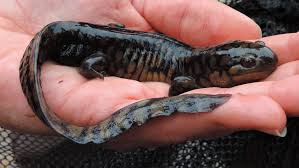 |
Salamanders
|
|
- Attention: They need no attention. Just observe them.
- Maintenance/handling: Easy
- Day/night active: Mostly nocturnal
- Allergy characteristics: Usually not a problem for allergy sufferers.
- Messy: Contained and clean.
- Odor: Almost no odor.
- Noise: Silent
- Grooming Requirements: none
- Rodent/insect phobia: Eat insect entrees that may upset the squeamish.
- Activity Level: No physical activity required for these pets.
|
- Housing: Aquarium
- Space Requirements: 2 feet tank
- Trainability: Not trainable
- Responsiveness: Not responsive
- Life span: 10 to 30 years
- Size: 5 inches
- Kid appropriateness: Not Recommended
- Pet compatibility: Not usually a problem. Exercise caution around large birds.
- Est. expense: $160/Year
|
|
 |
Scorpions
|
|
- Attention: They need no attention. Just observe them.
- Maintenance/handling: Easy
- Day/night active: Diurnal
- Allergy characteristics: Usually not a problem for allergy sufferers.
- Messy: Contained and clean.
- Odor: Almost no odor.
- Noise: silent
- Grooming Requirements: none
- Rodent/insect phobia: Poisonous, need to handled with gloves.
- Activity Level: No physical activity required for these pets.
|
- Housing: Aquarium
- Space Requirements: 1 cubic feet
- Trainability: Not trainable but tamable.
- Responsiveness: Not responsive
- Life span: 1 year
- Size: 2 to 3 inches
- Kid appropriateness: No. Should not be handled by young kids.
- Pet compatibility: OK
- Est. expense: $80/Year
|
|
 |
Tarantulas
|
|
- Attention: They need no attention. Just observe them.
- Maintenance/handling: Easy
- Day/night active: Nocturnal
- Allergy characteristics: Some people are allergic to the urticating hairs of the New World tarantulas. Bite and venom can be very painful; very rarely fatal to people.
- Messy: Contained and clean.
- Odor: Almost no odor.
- Noise: Silent
- Grooming Requirements: None
- Rodent/insect phobia: Have a high creep factor. Plus they eat live baby mice--although this menu item is optional.
- Activity Level: No physical activity required for these pets.
|
- Housing: Aquarium
- Space Requirements: 1.5 cubic feet
- Trainability: No
- Responsiveness: Not responsive
- Life span: 6 to 10 years
- Size: 2 to 3 inches 1/4 pound
- Kid appropriateness: Not Recommended
- Pet compatibility: OK, assuming the spider is enclosed.
- Est. expense: $80/Year
|
|
 |
Toads
|
|
- Attention: They need no attention. Just observe them.
- Maintenance/handling: Easy
- Day/night active: Nocturnal
- Allergy characteristics: Usually not a problem for allergy sufferers.
- Messy: Contained and clean.
- Odor: Almost no odor.
- Noise: Croak
- Grooming Requirements: none
- Rodent/insect phobia: Eat entrees that may upset the squeamish.
- Activity Level: No physical activity required for these pets.
|
- Housing: Aquarium
- Space Requirements: 5 cubic feet
- Trainability: No
- Responsiveness: Not responsive
- Life span: 20 to 30 years
- Size: 2.5 to 10 inches
- Kid appropriateness: Not Recommended
- Pet compatibility: OK
- Est. expense: $155/Year
- Note: The photo, courtesy of Rune Isaksen, was taken in Bjurtjärn, Värmland Sweden.
|
|
 |
Turtles
|
|
- Attention: They need no attention. Just observe them.
- Maintenance/handling: Maintenance and handling for turtles is very difficult.
- Day/night active: Diurnal
- Allergy characteristics: Usually not a problem for allergy sufferers.
- Messy: Contained and clean.
- Odor: Aquatic turtles can be extremely smelly--definitely not odorless, unless you spend alarge amount of money on a filter. Land turtles deficate a lot and do smell.
- Noise: silent
- Grooming Requirements: none
- Rodent/insect phobia: Eat entrees that may upset the squeamish.
- Activity Level: No physical activity required for these pets.
|
- Housing: Aquarium
- Space Requirements: 4 cubic feet is good for an aquatic turtle, or for starters with a small land turtle. Plan for expanded space for a large tortoise.
- Trainability: No
- Responsiveness: Does not need interaction, some become attached to owners. (Not a reference to snapping turtles)
- Life span: 30 to 100 years
- Size: Varies
- Kid appropriateness: They are not suitable for most kids because their requirements are difficult and expensive to meet, and also because they can carry salmonella, which is especially contagious for children. It is important to disinfect your hands after playing with the turtle or touching its tank--which most kids would not realize or remember to do
- Pet compatibility: They are compatible with most types of pets except dogs. Dogs can do serious damage to turtles if they think the turtle is a playtoy.
- Est. expense: $89/Year
|
|





































